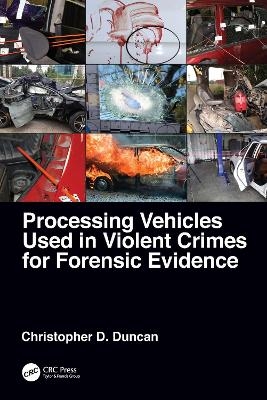
Processing Vehicles Used in Violent Crimes for Forensic Evidence
CRC Press (Verlag)
978-1-032-07933-2 (ISBN)
- Titel z.Zt. nicht lieferbar
- Versandkostenfrei
- Auch auf Rechnung
- Artikel merken
While there are numerous books on crime scene investigation and the processing of crime scenes, few focus on the processing of vehicles. Whether the crime took place in the car or the car was used to transport the suspect or victim—and, as such, is a secondary scene—investigating vehicles presents several unique challenges.
Processing Vehicles Used in Violent Crimes for Forensic Evidence fills this void providing the technical instruction sorely needed in this area of crime scene investigation. The book is geared not only to investigators who process vehicles involved in general crimes but also with a specific focus on violent crimes. Coverage includes details as to how investigators should document the vehicle in a logical and methodical manner that is easily understood and replicated for various scenes. By identifying the unique challenges caused by working in the tight quarters of a vehicle—especially in photographing the vehicle, the evidence within it, and how to best find, collect, document, and preserve the evidence—the author provides a unique reference for investigators. Special attention is paid to documenting shooting incidents, the proper detailing and documentation of bullet trajectories, bloodstain documentation, and processing vehicles for other biological, impression, and physical evidence.
Key Features
Presents crime scene collection and preservation techniques and methodology specific to vehicle-related considerations
Outlines the unique challenges, and step-by-step procedural requirements, necessary to conduct a vehicle or vehicle-related scene investigation
Addresses types of various evidence for vehicles—including fingerprint, blood, DNA, bullet and casing, and fire debris—which are common primary or secondary crime scenes
While the book is geared toward crime scene investigators and forensic technicians who process vehicles used in crimes, it will be an invaluable resource for criminal justice and forensic science students, attorneys, death investigators, fire investigators, accident scene investigators, and scene reconstructionists.
Christopher (Chris) D. Duncan graduated from George Mason University with a BA in History and earned his MA in Criminology from the University of Houston-Clear Lake. He is a retired Senior Police Officer with the Houston Police Department and was previously an active member of the International Association for Identification (IAI). Chris has written several articles on forensic evidence college and documentation and has over 1500 hours of training specific to the documentation, collection, and the processing of physical evidence having worked 20 years of his 29 years in law enforcement as a Crime Scene Investigator. Prior to his days in the Crime Scene Unit, he was assigned as a patrol officer and a Gang Task Force Officer. Chris is now a and teaches Criminal Investigation and Law Enforcement classes at Klein Collins High School in Texas.
1. Introduction to Processing Vehicles Involved in Violent Crimes. 2. Vehicle Examination Facility and Processing Equipment. 3. General Guidelines and Strategies for Processing Vehicles. 4. The Documentation of Motor Vehicles. 5. The Photographic Documentation of Vehicles. 6. Advanced Photography Techniques of Challenging Subjects. 7. Deoxyribonucleic Acid Evidence. 8. Fingerprint and Impression Evidence Involving Motor Vehicles. 9. Processing Vehicles Involved in Shootings. 10: Bloodstain Documentation and Processing.
| Erscheinungsdatum | 22.11.2021 |
|---|---|
| Zusatzinfo | 1 Tables, color; 288 Halftones, color; 288 Illustrations, color |
| Verlagsort | London |
| Sprache | englisch |
| Maße | 178 x 254 mm |
| Gewicht | 920 g |
| Themenwelt | Recht / Steuern ► Strafrecht ► Kriminologie |
| Sozialwissenschaften ► Soziologie | |
| ISBN-10 | 1-032-07933-9 / 1032079339 |
| ISBN-13 | 978-1-032-07933-2 / 9781032079332 |
| Zustand | Neuware |
| Informationen gemäß Produktsicherheitsverordnung (GPSR) | |
| Haben Sie eine Frage zum Produkt? |
aus dem Bereich


